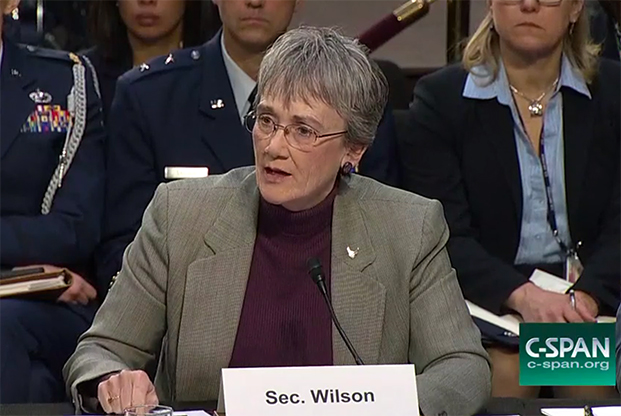
Air Force Secretary Heather Wilson testifies before the Senate Armed Services Committee on March 7, 2019. C-SPAN screenshot.
The Air Force plans to improve the quality of privatized on-base housing through steps such as giving base commanders more oversight and improving communication with airmen to earn back their trust, top USAF officials told lawmakers on Thursday, as all three military services also proposed a draft “bill of rights” for military housing tenants.
Air Force Secretary Heather Wilson and Chief of Staff Gen. David Goldfein told the Senate Armed Services Committee that airmen had lost trust with the service because of staggering issues with on-base housing. During an Air Force-wide review of housing conditions, residents of 9,861 units requested in-person visits. Twenty-five percent of them suffered from mold or moisture problems, 5 percent “had chipped or flaking paint,” 13 percent contained vermin droppings or other evidence of their presence, and 71 percent had “other maintenance concerns.” The overall review was based on responses from 50,991 residents of Air Force base housing.
“Our military families deserve good housing, and when there’s a problem with a house, it should be fixed promptly, and competently. Moreover, our airmen should be comfortable that they can identify problems without any fear of retaliation,” Wilson said in submitted testimony. “The real question is, where do we go from here?”
Wilson and Goldfein visited the “most troubled installations” in the service to view the problems first hand and speak with airmen, installation leadership, and privatized housing owners. They learned there wasn’t sufficient “quality assurance” placed on maintenance crews, poor construction quality has caused chronic mold issues, and using fees to punish the housing owners isn’t working. Additionally, airmen need to be better educated on their rights, and housing management officers need more authority, they said.
The Defense Department on Wednesday released a draft version of the Military Housing Privatization Initiative Bill of Rights, which was co-authored by Wilson, Army Secretary Mark Esper, and Navy Secretary Richard Spencer. The document would grant service members and their families living in privatized housing 12 additional rights on top of existing protections granted by their lease terms and the law.
Among other rights, the proposed document states that tenants are entitled to:
- Withhold BAH payments from landlords while disputes are being decided
- Access quick, professional home repairs with free, temporary housing available if the fixes are linked to an issue that endangers tenants’ lives, health or safety
- Have a “housing advocate” to give them advice and support, and plead their cases before their landlord.
- Have a third party decide landlord-tenant disagreements that involve “repairs, damage claims, and rental payments”
- Have BAH payments withheld from landlords while disputes are being decided
- Share concerns with governmental housing or installation officials without fearing retaliation
- In a March 6 release, the Air Force said the document will take effect “in the coming weeks.” The military would likely need to renegotiate agreements with housing owners, and revise the incentive fee structure to give the military more leverage, according to the testimony.
Wilson and Goldfein said the document’s creation was inspired by a desire to give military renters more leverage when their landlords are dropping the ball. They believe that building “local third-party arbitration” into the document will help make sure maintenance crews respond to tenant concerns proactively and competently.
Wilson said next steps for improving on-base housing conditions and the system, in general, include:
- Tackling the health and safety problems the investigation uncovered
- Clarifying expectations for commanders and the Air Force Civil Engineering Center
- Getting congressional input on the proposed tenant’s bill of rights and and making it official
- Strengthening “the base commander input, oversight and eyes-on when it comes to family housing” by providing them with increased feedback “on performance fees, more support when it comes to quality control in their own housing offices,” and additional backup from the AFCEC and the representatives who handle privatized housing contracts
- Improving “communications and feedback loops” to earn back airmen’s trust
- An Inspector General review to figure out additional steps required to improve privatized housing
- Having Air Force Office of Special Investigations investigate allegations of fraud
- Implementing an Infrastructure Investment Strategy to make housing management office staff more capable and to expand their capacity. “This strategy is focused on developing and retaining civil engineering expertise, while adding enough trained staff to manage our housing management offices effectively”
- Setting up a nationwide call center residents can use to escalate housing worries
- Assuring proper information sharing between medical and installation leadership
- Educating military families about privatized housing
- Incorporating civil engineering support and privatized housing training into senior non-commissioned officer and first sergeant courses
Wilson also said she thinks the concept “of a common lease” for military tenants across the services “makes sense because we do have members on each other’s facilities.”